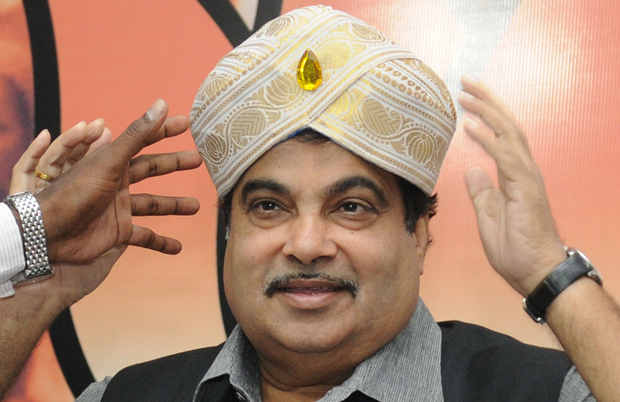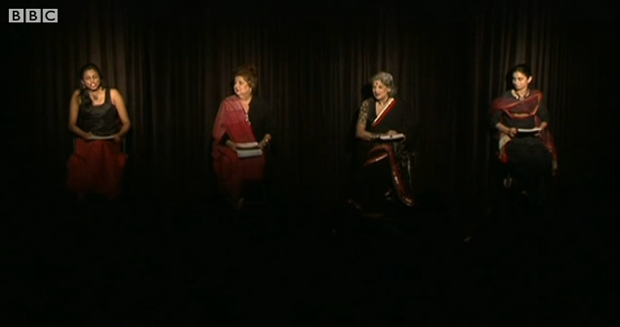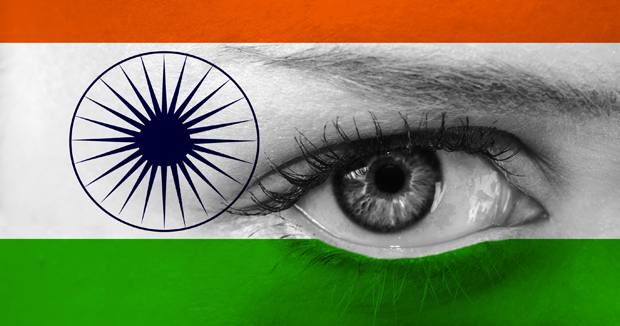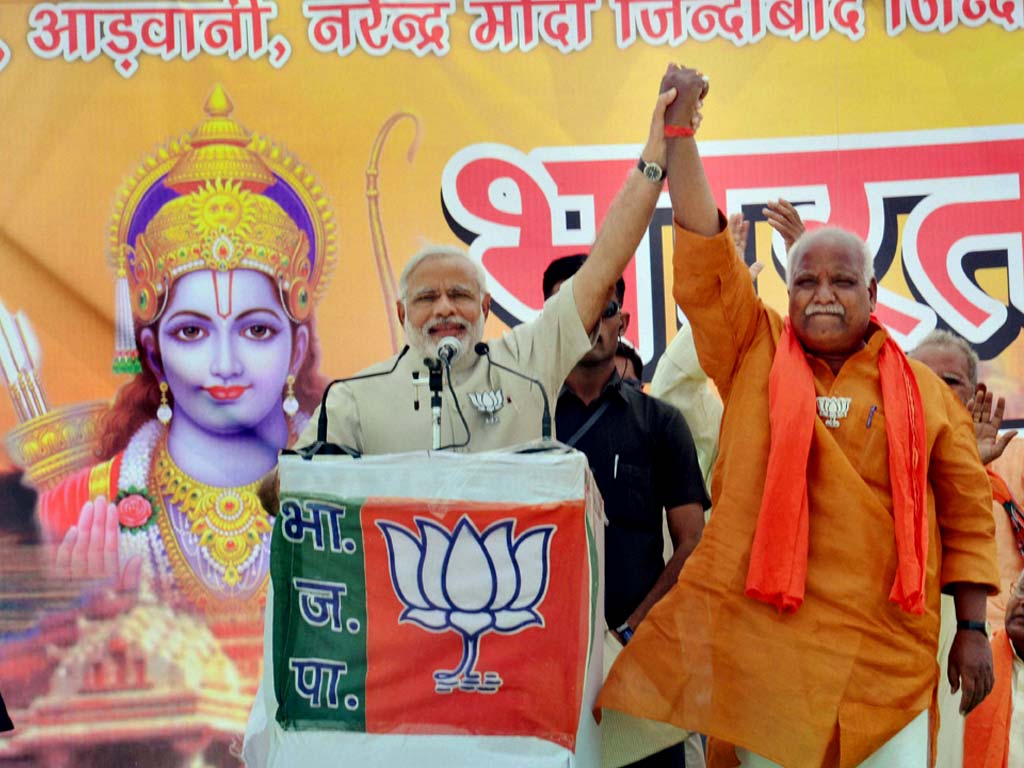29 May 2014 | India, News and features, Politics and Society

Nitin Gadkari, a politician with a chequered, if not dubious record of integrity and probity, had a political opponent arrested for slander. (Photo: Amit Kumar/Demotix)
Once, President Lyndon Johnson was caught in the crossfire of an anti-Vietnam war protest. A placard was shoved in his face: “LBJ pull out, like your daddy should have done.” Sure, LBJ got the pun, as would have Anthony Weiner in our present times, but he remained unperturbed. Consider Lady Violet Bonham Carter’s biting repartee to an irresolute Sir Stafford Cripps, saying he “has a brilliant mind — until it is made up”.
Mordant wit is what makes politics and political debates sparkle with brilliance, besides deflating windbags and putting stuffed shirts in their place. Even if the “sourcasm” is discounted, plainspeak and no-holds barred verbal duels contribute in no small measure to ensuring accountability, for who isn’t mortally petrified of lacerating criticism?
Turns out that in India, folks with brittle egos and skeletons stacked up in their closets, can and will wield the law to clam a critic’s mouth shut, and even have them put in jail. And this is irrespective of resorting to some risqué puns.
Arvind Kejriwal, founder of the Aam Aadmi (Common Man) Party, who is out on a limb to eradicate the scourge of corruption, realised this to his peril when Nitin Gadkari, a politician with a chequered, if not dubious record of integrity and probity, had him arrested for slander. Slander? No, Gadkari wasn’t invoking some law of the Middle Ages or the Victorian Era. He was merely invoking Sections 499 and 500 of the Indian Penal Code which criminalise defamation, both in writing as well as verbal statements. Kejriwal called Gadkari “corrupt” because not very long ago, the latter did come under the scanner for alleged massive illegalities in his business dealings, but managed to wriggle out since no legal investigation or prosecution were launched.
These two provisions are so broad in scope that every insinuation, unless proved to have been made in “good faith”, can land someone in prison. Someone like Kejriwal, who was incarcerated for six days until he was let out on bail yesterday. Now how does one prove “good faith”, that too, “beyond reasonable doubt”, since that remains the standard of proof in criminal law? Worse, a person can be taken into custody even while this seemingly Herculean task is getting done.
As if criminalisation of libel isn’t bad enough, punishing “slander” grants almost instant impunity if one is strategic enough. Take Kejriwal’s example, again. In October and November last year, he addressed a press conference and read out from a list of charges against business tycoon Mukesh Ambani. The businessman lost no time in slapping legal notices against every television channel which broadcast the conference. Libel chill, without a shred of doubt, for all the channels went silent. Whether Ambani’s fleece is as white as snow isn’t the question; his dark deeds of pulverising criticism are, and deserve the most trenchant critique.
It is encouraging to note that already demands are being made for decriminalising libel, but unless slander is banished from the statute books, dangers would continue to lurk. The Law Commission of India has taken a laudatory and timely step by releasing a consultation paper which seeks to unshackle the media from apprehensions of libel chill. But what happens to individuals — political activists, or whistleblowers? A possible solution lies in Gertz v. Robert Welch, Inc. wherein the Supreme Court of the United States extended the Sullivan privilege (named after the legendary NYT v. Sullivan case) — that only statements made with naked malice or reckless disregard for the truth shall be held as defamatory — available to media houses, to certain categories of individuals also. Those “seeking governmental office” and those who “occupy positions of such persuasive power and influence that they are deemed public figures for all purposes” were accorded protection. Recently, this has been adopted in international money laundering law of PEPs or Politically Exposed Persons. It includes, “individuals who are or have been entrusted domestically with prominent public functions, for example, heads of state or of government, senior politicians, senior government, judicial or military officials, senior executives of state-owned corporations, important political party officials”.
Back in 2011, the UNHRC (United Nations Human Rights Committee) issued a declaration condemning Philippines’ provisions of criminal libel as a violation of the ICCPR. One hopes India wouldn’t require such a slap on the wrists to amend the repugnant law which rewards dishonest claims of calumny.
This article was published on May 29, 2014 at indexoncensorship.org
27 May 2014 | India, News and features, Politics and Society, Religion and Culture

The Vagina Monologues performed in Mumbai in 2013 (Photo: BBC News)
“If Chennai doesn’t have vaginas, it is full of a#*holes!” quipped Mahabanu Mody Kotwal in the opening act of The Vagina Monologues when it was staged in Mumbai. The veteran theatre actor and director had good reason for using the pun. In December 2010, when the play was to be staged in the city for the first time, the Police Commissioner played spoilsport at the eleventh hour and declined permission. Earlier this year, a play on the Partition of India wasn’t allowed to be staged in Bangalore, and yes, Chennai. In both cases, it was the police which called the shots in the cancellations. Theatre’s subversive and liberating potential is renowned, and governments the world over have never held themselves back from wielding the censor’s bludgeon, but in India, it is the police which has been vested with remarkably sweeping powers to crack down on theatrical performances.
However, Chennai’s travails might well be over because in January this year, the Supreme Court struck down those provisions of the legislation – The Tamil Nadu Dramatic Performances Act, 1964 which permitted the cops to be the sole arbiters of “suitable” drama in the first place.
The roots of this legislation go back to the days when India was under British rule and the colonial administration remained constantly paranoid about “the natives” being up to mischief. Their fears were precipitated in 1876, when a Bengali play “Neel Darpan” (A Mirror to Indigo) was staged in Calcutta and got a rousing response, even from many Englishmen. The play narrated how farmers in Bengal and other provinces were being forced to cultivate indigo, and if they refused, were meted out the most terrible of punishments. This made the livid rulers who termed the play “scurrilous”, enact a law “to empower the government to prohibit certain dramatic performances”. The stated object of this law was to “prohibit Native plays that are scandalous, defamatory, seditious, obscene, or otherwise prejudicial to public interest”. Of course, “otherwise prejudicial to public interest” was left undefined, further empowering the censors.
It was hoped that independence would free drama from the shackles of this repressive law, but the reverse happened. Different states in India brought in their own legislations to control theatre, and most of them tightened the grip more than the British ever did.
For instance, the present legislation was geared towards proscribing “objectionable” plays and pantomimes. Section 2 (1) defined “objectionable” as anything which was likely to:
be seditious
(i) incite any person to commit murder, sabotage or any offence involving violence; or
(ii) seduce any member of any of the armed forces of the Union or of the police forces from his allegiance or his duty, or prejudice the recruiting of persons to serve in any such force or prejudice the discipline of any such force;
(iii) incite any section of the citizens of India to acts of violence against any other section of the citizens of India;
(iv) is deliberately intended to outrage the religious feelings of any class of the citizens of India by insulting or blaspheming or profaning the religion or the religious beliefs of that class;
(v) is grossly indecent, or is scurrilous or obscene or intended for blackmail; and includes any indecent or obscene dance.”
Thus, one is left in no doubt that the only form of ‘non-objectionable’ theatre would be bland, pantomimes extolling the virtues of mythology and religion; even then, one could never be sure, because religious sentiments in India are nothing short of a communal tinderbox.
If these antediluvian definitions weren’t enough, the police could act against the producer, director, troupe, and even the person who either owned or let out the premises where the play was to be staged. And there lurked the gravest danger- carte blanche powers of pre-censorship. Scripts of plays were to be submitted to the police for approval, and even though an opportunity of hearing was provided before the final call could be taken, it was hollow formality because the history of the legislation’s implementation proves that permission was granted only when the director or the playwright agreed to some of the mandated excisions.
In fact, the government was so unwilling to relinquish control that it told the Court of its willingness to appoint an officer to “guide the police commissioner in the cultural nuances” since literary sensibilities aren’t usually policemen’s forte!
The Supreme Court has broken the police’s stranglehold in Tamil Nadu; the time is ripe for challenging similar laws proscribing dramatic performances in other states and restoring to theatre the freedom it always deserved.
This article was posted May 27, 2014 at indexoncensorship.org
21 May 2014 | Digital Freedom, India, News and features, Politics and Society

(Photo illustration: Shutterstock)
Indians, ever a chatty lot, are obsessed with the idea of being obsessed with social media. That is why, as the BJP’s stunning victory in the Indian general elections was declared, the news media immediately began to examine the impact of social media campaigning in the elections. Numbers aside, the victory over social media has revealed the fault lines of Indian society as it stands today.
India’s online population is small as compared to its offline population – about 213 million users to 1.2 billion people – but it is growing. Though these figures expand and contract depending on whom you ask, we do know that 33 million are on Twitter and Facebook has hit the 100 million-user mark. Given these statistics, it is indeed impressive that India’s newest Prime Minister, Narendra Modi has 4.2 million followers on Twitter already. The would-be leader of opposition, Rahul Gandhi, whose party did not win enough seats to actually assume the seat as leader of the opposition in parliament, isn’t on Twitter. However, his party has an account, with about 181,000 followers. There are other political stars on social media, including individual members of various parties, and notably, members of the newly formed Aam Aadmi Party.
However, when asked the question: “who won the social media war” – because, to be sure, there was one – the answer can only really be Narendra Modi. In fact, his own campaign machinery was so well oiled that his personal profile overshadowed his party. “Ab ki baar, Modi Sarkar” (this time, a Modi government) was arguably the catchiest slogan on the campaign and it inspired many a joke, including a takeover of the nursery rhyme – “twinkle, twinkle, little star, ab ki baar, Modi sarkar!” And according to reports, the BJP was mentioned on Twitter, on average, about 30,000 times a day, with the Congress trailing behind at between 15,000-20,000. Modi’s victory tweet promising a better India after election results were declared was retweeted 69,872 times.
Truthfully, there is no way that social media could have supplanted the traditional route. Modi’s tireless campaigning – 437 rallies, 5,827 public interface events across 25 states that is a distance of 300,000km – is impressive. But, equally impressive was the BJP’s entire digital campaign effort; a “social media war room” that reportedly cost Rs 35 lakh (35,000 GBP), with 30 computers and about 50 volunteers, tracking activities across India’s 92,000 villages. And accounts from insiders, young professionals, many whom took sabbaticals from their jobs to participate in this campaign, talks of a breathless environment, where Facebook was used to crowdsource ideas for speeches, and ‘Mission 272’ (in terms of how many seats they were aiming to win) became a reality. In fact, many creative contributions from BJP’s supporters – videos, jingles, songs and poems – can be found on the website.
At the same time, social media has been very revealing about the state of the Indian majority. The tonality of political discourse over the internet, which was very polarized between the Hindu rightwingers and secularists saw vicious language, trolling and hate speech dotting the landscape. However, the Hindu right, abused as communal in the time of the Congress government have emerged victorious and unapologetic about their political leanings. In public groups on Google Plus, cyber Hindus declare that a “pro Hindu lobby is not an option, but a sheer necessity.” In fact, the ‘liberal’ discourse that sweeps much of the mainstream English media was taken aback at the sweeping victory that the BJP has earned in this election. There is nervousness that the BJP, supported and guided by the RSS – Rashtriya Swayamsevak Sangh—a right-wing, nationalist group espousing strict discipline, martial training and self sacrifice in defence of the Motherland, often derided for being extremist – will work towards a majoritarian agenda where minorities will find less space to exist. These fears are compounded by the RSS’s beliefs – formalized in annual reports – that seek to impose a strict moral code that frowns upon live-in relations, homosexuality and also keeping an eye on minority communities. The RSS has being heartened by educated Indians joining their cause via social media, thereby signaling that their views might no longer be frowned upon as extreme or communal. They do not want to apologize for representing the view of the Hindu right.
And on cue, Narendra Modi, in a rousing speech formally accepting his role as the leader of the majority party in Parliament, promised his fellow BJP MPs that by the birth anniversary of Pandit Deendayal Upadhyaya in 2016, co-founder of the Bharitiya Jan Sangh that later became the BJP as known today, India shall rise to its promise of being a great nation. Tying down his campaign promises to his deep association with the RSS, the signal is clear. Indeed, Atal Bihari Vajpayee, the former Prime Minister, had affirmed proudly that “the Sangh is my soul”. The Hindu is back in Hindustan (another name for India).
An analysis in India Today magazine has declared the Indian cybersphere ‘saffron’ (the color associated with the Hindu right) writing, “But their agenda is a mix of post-modern and traditional. They oppose dynasty politics, particularly the Nehru-Gandhi clan and its allies such as Shiv Sena. They call minority appeasement ‘pseudo-secularism’ with such fervour that their sentiment could easily be interpreted as Hindu supremacist or anti-Muslim. They are against lower-caste reservation, particularly because it is poorly implemented. They are concerned about internal security. But above all, they are against corruption.” In deconstructing the ways of the Hindu saffron social media user, the article offers certain clues, such as the words “proud”, “patriot” and “Hindu” appearing in their bios, and often uploading images of Hindu gods as their display picture.
The people have spoken. The media is filled with analysis that people have either embraced Modi for his Hindu leanings, or ignored them in order realize the dream of “development” that is has promised to deliver. The number of Muslim MPs in parliament is down to 21 from 30 in the last session, the lowest number since India’s first elections. The Congress and its allies, who built careers on carefully constructed platforms of secularism – in their first term, they had a Muslim President, Sikh Prime Minister and Christian leader of the party – have been set aside in favour of a openly religious and Hindu BJP. Whatever be the reasons for the vote, for the everyday people tweeting and Facebooking, it appears that being pro-Hindu is slowly being disassociated with being communal. For many, this is a relief.
It seems it might finally be hip to be Hindu.
This article was posted on May 21, 2014 at indexoncensorship.org
15 May 2014 | India, News and features, Religion and Culture

Modi invoked Lord Ram while addressing a meeting in Faizabad, barely six kilometres from Ayodhya. He shared the stage with the Faizabad candidate Lalu Singh who was issued a notice by the EC for displaying religious portraits.
“The Ram- Rahim ideal and the secular ideology are often the stuff of an Indian politician’s election haberdashery, not his soul-stuff.” Justice Krishna Iyer of India’s Supreme Court was scathing in his criticism of those electoral candidates who canvass votes in the name of religion or by instigating polarisation among different religious and ethnic communities. Besides violating India elections law, they also damage the country’s secular fabric.
The law is Section 123(3) of the Representation of the People Act, which deems candidates’ or their agents’ appeal for votes on the basis of religion or religious symbols as a “corrupt practice”, and if found guilty, entails disqualification.
On May 6, while campaigning for Lalloo Singh, the Bharatiya Janata Party’s (BJP) candidate from Faizabad, Narendra Modi, with the picture of Ram, a mythological king of ancient India, revered as a god by the Hindus, adorning the background, promised to bring about “Ram Rajya” (kingdom of Ram) if voted into power. The Election Commission was quick to order an investigation for a violation of the election law as well as the Model Code of Conduct–a set of guidelines which aren’t legally binding.
As it has become de rigueur for a Hindu Right party like the BJP, bellicose arguments about violation of the fundamental rights to freedom of religion and freedom of expression were relentlessly trotted out. The truth is quite different, because the Supreme Court has held that the restriction on religious electioneering doesn’t impinge upon any such right.
When the constitutional validity of Section 123 (3) was challenged in 1954, a bench of five Supreme Court judges while upholding the provision held that it does not prevent a man from speaking and merely prescribes conditions which must be observed if he wants to enter parliament. The right to contest an election is not a common law right but a special right created by a statute and the statutory provisions have no bearing on the fundamental rights. Then when a similar challenge was mounted again in 1965, the court affirmed its earlier decision and stated that the law acted as a wedge against the secular, democratic process being vitiated by bigotry and violence. It must be mentioned that both these judgements hold ground to this day.
Going back to Modi’s speech, take a look at the photograph, and some more facts. “Ram Rajya”, which the BJP so desperately tried to pass off as a moniker for good governance, is an exclusive Hindu term, and no one professing any other faith would ever use that expression. The setting in which the speech was delivered makes Modi’s actions all the more egregious. He was speaking at Faizabad in Uttar Pradesh, which is only a stone’s throw away from Ayodhya, which has attained permanent notoriety for the site of the demolition of the Babri Mosque in 1992 by hordes of militant Hindus swearing fanatical allegiance to the BJP and its associated parties. In fact 6 December 1992 marks that watershed moment when communalism became an inalienable and vicious part of Indian politics. Things have only slid downhill from there, and who can forget the carnage in Gujarat in 2002 (under Narendra Modi’s watch)?
And the fact that Lalloo Singh is one of those arraigned as accused for razing the mosque to the ground leaves no one in any doubt as to Modi’s real agenda- to whip up Hindu communal passions and garner as many votes as possible.
Modi’s increasingly strident bigotry has bared its fangs open in the last lap of the election campaign. Only on May 5, he tried to charm his Uttar Pradesh supporters by thundering that only those who worship Durga–a Hindu goddess–are true Indians, and all Muslim migrants will be deported once he came to power.
It remains a mystery and one of grave consternation as to why the Election Commission finally went easy and took no action. But a fitting reply to the last Modi apologist would be -the promise of building a Ram temple over the pulverized mosque occupies pride of place in the BJP’s election manifesto.
This article was posted on May 15, 2014 at indexoncensorship.org




